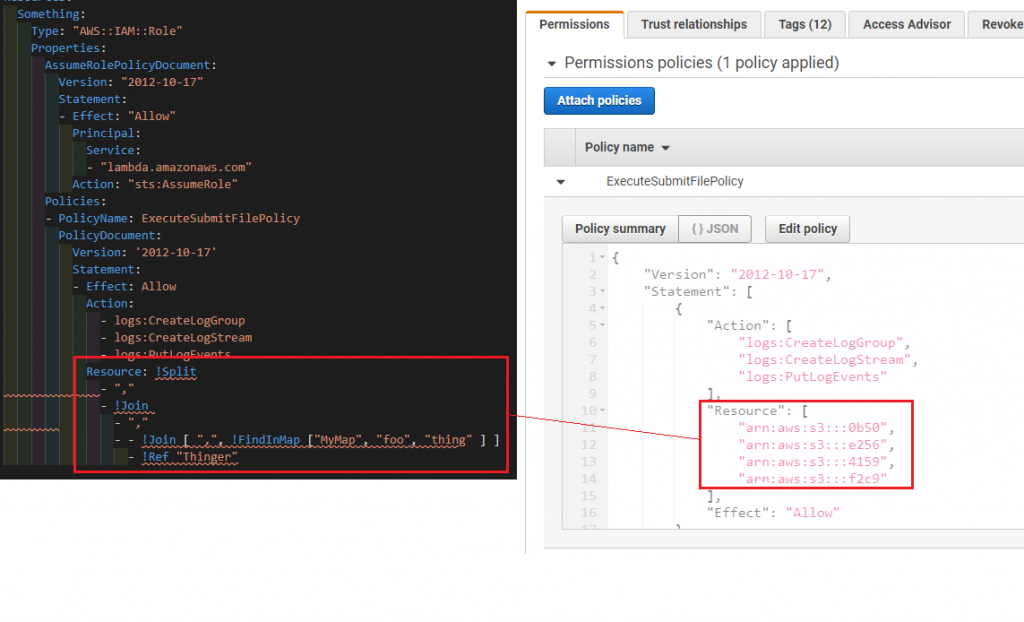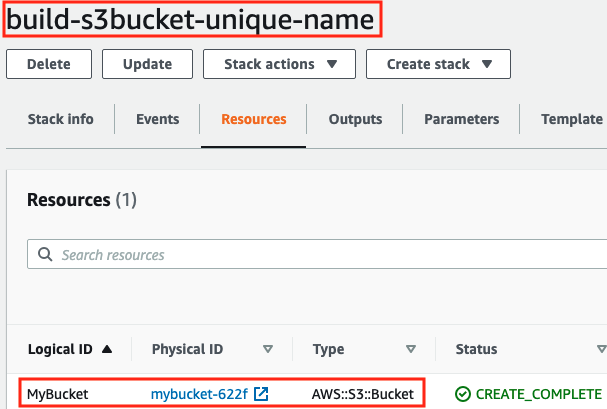Append to a Static List in a YAML CloudFormation Template
When writing CloudFormation stack templates, I sometimes need to create a list combining things defined at runtime and static values.
Imagine you have a template that contains a mapping, which enumerates IAM roles by environment. You want to grant permission to these roles as well as one or more Lambda execution roles. Can you create a list comprised of the static values defined in your map with references to roles created as part of your stack?
The FindInMap intrinsic function returns a set when the mapped value is a list, such as in our example. The Join function creates a string composed of the elements in the set separated by a given value.
You may perform a join on a set returned from the FindInMap function, returning a string composed of the elements in the set delimited by comma. You can then join the comma delimited string with a list of values. This second list can include references to resources created in the template.
!Join
- ","
- - !Join [",", !FindInMap ["MyMap", "foo", "thing"]]
- !Ref "Thinger"The following shows a CloudFormation stack template using this technique juxtaposition to an instance of the provisioned resource..

Notice the provisioned resource is a superset of the two lists. The following is the complete template:
Description: Sample Stack
Parameters:
Thinger:
Type: "String"
Default: "arn:aws:s3:::f2c9"
Mappings:
MyMap:
foo:
thing:
- "arn:aws:s3:::0b50"
- "arn:aws:s3:::e256"
- "arn:aws:s3:::4159"
thang:
- "arn:aws:s3:::8199"
- "arn:aws:s3:::d9f1"
- "arn:aws:s3:::bc2b"
bar:
thing:
- "arn:aws:s3:::bd69"
- "arn:aws:s3:::eb00"
- "arn:aws:s3:::0f55"
thang:
- "arn:aws:s3:::5ebc"
- "arn:aws:s3:::4ccb"
- "arn:aws:s3:::85c2"
Resources:
Something:
Type: "AWS::IAM::Role"
Properties:
AssumeRolePolicyDocument:
Version: "2012-10-17"
Statement:
- Effect: "Allow"
Principal:
Service:
- "lambda.amazonaws.com"
Action: "sts:AssumeRole"
Policies:
- PolicyName: ExecuteSubmitFilePolicy
PolicyDocument:
Version: "2012-10-17"
Statement:
- Effect: Allow
Action:
- logs:CreateLogGroup
- logs:CreateLogStream
- logs:PutLogEvents
Resource: !Split
- ","
- !Join
- ","
- - !Join [",", !FindInMap ["MyMap", "foo", "thing"]]
- !Ref "Thinger"
Outputs:
UnifiedList:
Value: !Join
- ","
- - !Join [",", !FindInMap ["MyMap", "foo", "thing"]]
- !Ref "Thinger"
The utility of this technique is debatable. That said, it’s a useful pattern for joining two sets in a CloudFormation stack template.
